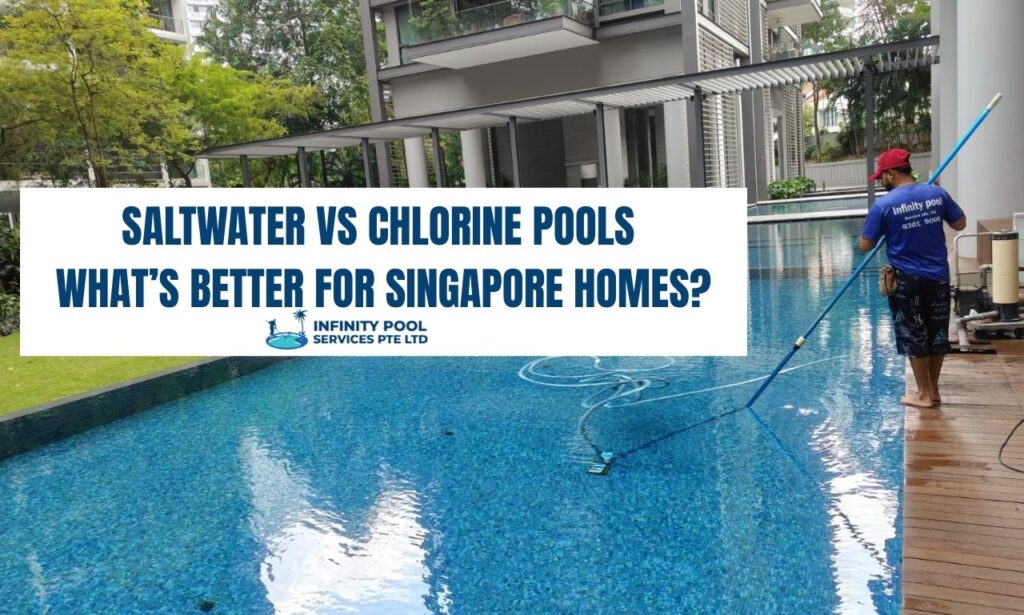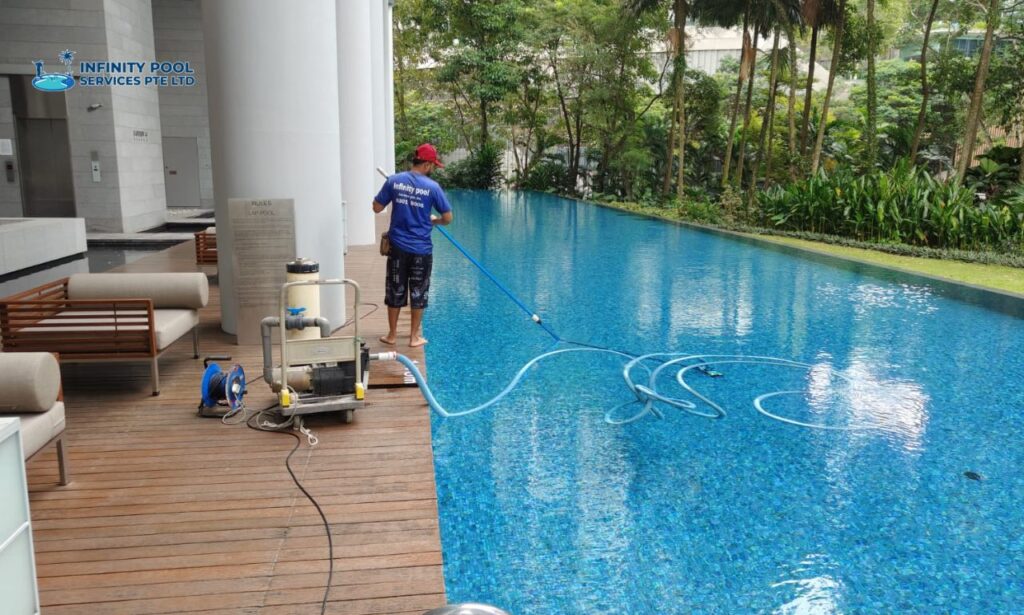Thinking about which type of pool is better for your home, between saltwater vs chlorine pools? It’s something many homeowners in Singapore think about when planning a pool at home. To put it simply, saltwater pools turn salt into chlorine by themselves, while chlorine pools need you to add chlorine manually to keep the water clean. So, which one should you pick?
It really depends on —
- What kind of maintenance you’re okay with,
- How much you want to spend
- and what feels better for your skin.
Since Singapore has hot and rainy weather, and certain rules for home pools, we’ll walk you through all the details so you can make the best choice for your home.
What Exactly is a Saltwater Pool?
A saltwater pool is actually still a chlorine pool. But instead of you pouring in chlorine every week, the pool does the job itself. It has a special machine called a salt-chlorine generator that takes the salt in the water and turns it into chlorine. Simple, right?
This means the chlorine stays more balanced, which is better for your skin and eyes. You won’t get that strong smell either. The water feels much smoother and softer, too, which is nice when you’re swimming or even just dipping your feet. Lots of newer homes are going for saltwater pools now because they feel more natural and are easier to maintain. And the best part is that you don’t have to handle or store those big tubs of chlorine anymore.
What is a Chlorine Pool?
Now, a chlorine pool is the more common and traditional type where you have to add chlorine yourself, usually using tablets, liquid, or powder. You’ll also need to test the water often to make sure the chlorine level is not too low or too high. If it’s too low, things like algae or bacteria can grow. If it’s too high, it can make your eyes red, your skin feel itchy, or even make the water look cloudy. Every now and then, you might need to do something called a shock treatment. That just means putting in extra chlorine to clean the water more deeply, especially if it’s been raining a lot or the pool looks dirty.
One nice thing about chlorine pools is that they cost less to set up in the beginning. But over time, all the chemical buying and testing can take more effort and end up costing more than you’d expect.
Saltwater vs Chlorine Pools: Key Differences
Here’s a full side-by-side comparison to give you a clear explanation:
Saltwater vs Chlorine Pools: Key Differences
Here’s a full side-by-side comparison to give you a clear explanation:
| Feature | Saltwater Pool | Chlorine Pool |
| Chlorine Source | Generated from salt using a salt cell | Manually added as tablets or liquid |
| Water Feel | Softer, gentler on skin and eyes | Can be harsh if not properly balanced |
| Smell | Mild or no smell | Strong chlorine smell |
| Maintenance Frequency | Once a month (basic checkups) | Weekly or more (chemical balancing) |
| Setup Cost (Singapore) | High (Approx $5,000 – $12,000 SGD) | Low (Approx $3,000 – $8,000 SGD) |
| Yearly Chemical Cost | Low (Approx $100 – $250 SGD) | High (Approx $300 – $700 SGD) |
| Generator Replacement | Every 3–7 years | Not needed |
| Long-Term Cost | Lower | Higher |
| Equipment Care | Requires generator cleaning | Basic pump and filter care |
| Corrosion Risk | Higher (especially on metals) | Lower |
| Environmental Impact | Fewer chemicals, more eco-friendly | Higher chemical usage |
| Regulation in Singapore | Needs NEA approval (as an alternative system) | Already approved |
Pool Maintenance in Singapore: What You’ll Be Dealing With
Singapore’s weather is warm and humid all year, so no matter which pool system you pick, you’ll have to take care of your pool regularly. Here’s how the two compare side by side:
Chemical Balancing
For saltwater pools, the machine does most of the work by keeping the chlorine levels steady. You just need to check the pH once a month or so because it can slowly go up over time. For chlorine pools, you have to test the chlorine, pH, and alkalinity at least once a week. When it rains a lot, you might need to check even more often because the rainwater can wash away the chlorine.
Equipment Upkeep
Saltwater pools have a special part called a salt cell that needs cleaning and checking every few months. Also, the salt can cause metal parts nearby to rust if you don’t watch it carefully.
Chlorine pools use simpler equipment. Just a pump, a filter, and the chemicals. It’s easier to handle, but you’ll spend more time adding chemicals and doing manual checks.
Cleaning Requirements
With saltwater pools, you still need to brush and vacuum regularly to stop salt from building up and causing white spots or scaling.
Chlorine pools need more cleaning because algae can grow faster, and the water can get cloudy. So, you might have to brush, vacuum, and do shock treatments more often to keep it clear.
Got a pool at home? See Why doing Weekly Swimming Pool Maintenance in Singapore keeps it clean and safe for your family.
Legal and Safety Considerations for Both Pools in Singapore
In Singapore, both saltwater and chlorine pools are allowed, but saltwater pools have a few more rules. Chlorine pools don’t need special approval because NEA already accepts chlorine as the main way to clean pool water.
Saltwater pools, on the other hand, need approval since salt-chlorination is seen as an alternative disinfectant, and they have to meet the same water quality standards. If your pool is deeper than 1.5 meters, you’ll need a permit from the Building and Construction Authority.
Most private home pools don’t need a license unless used for business. When it comes to chemicals, always store chlorine and acids separately, use secure storage or bund walls if you have a big setup, and never mix chemicals yourself. Follow all safety rules to keep things safe.
Want to spend less on your pool? Check how regular pool care helps you save money over time.
Health and Eco-Friendliness: Which Pool is Safer and Greener?
Let’s see which one is safer and better for the environment.
| Risk Type | Saltwater Pool | Chlorine Pool |
| Skin and Eye Irritation | Very low | Can cause redness and dryness |
| Breathing Issues | Minimal | Can cause coughing or asthma |
| Chloramine Exposure | low | Higher, especially indoors |
Too much chlorine in pools can cause:
- Red eyes
- Coughing and breathing trouble
- Skin dryness
- Even nausea if water is swallowed
- Possible long-term effects of chloramines.
Eco Impact:
- Saltwater pools use fewer chemicals and create less waste
- But they do use more electricity for the generator
- Chlorine pools create more chemical byproducts and need proper disposal.
Best Choice for Families in Singapore: Saltwater vs Chlorine Pools
If you’ve got kids, pets, or sensitive skin, saltwater pools are:
- Gentler
- Safer for eyes and skin
- Less harsh-smelling
But remember that saltwater pool:
- Initial cost is higher
- Requires NEA approval
- Best to hire a certified pool contractor to handle installation and paperwork.
Must-Have Upgrades for Any Pool
These tools and systems make both pool types easier to manage:
- Robotic Pool Cleaner: Saves you time by cleaning the pool automatically
- Heat Pump: Keeps the pool warm and usable all year
- Leak Detection System: Detects underground leaks early to avoid high water bills
- Fence or Screen: Keeps debris out and adds safety if you have children or pets.
Wrapping Up – Which Pool Wins Between Saltwater vs Chlorine Pools?
Go for a saltwater pool if you want soft water, fewer chemicals, and long-term savings. On the other hand, stick with a chlorine pool if you’re on a tighter budget, want faster approval, or prefer traditional maintenance.
No pool is 100% hassle-free, but the right choice depends on your family’s needs, budget, and comfort. If you’re building a new pool or upgrading, always speak to a licensed pool contractor in Singapore and check NEA and BCA guidelines first.
Plus, whatever pool you choose for your Singapore home, keeping it clean and safe is super important. At Infinity Pool Services PTE LTD, we handle everything from regular swimming pool cleaning to repairs and full maintenance.
You’ll get clear water, expert care, and zero stress.
Just call us, and we’ll take care of the rest!
FAQs:
Can I convert my chlorine pool into saltwater?
Yes, you can convert your chlorine pool into saltwater. You’ll just need to add a salt-chlorine generator and adjust some pipes to make it work properly.
Is a saltwater pool safe for pets?
Yes, a saltwater pool is much gentler than a regular chlorine pool. Just remember that you have to rinse your pet with clean water after swimming.
How often should I test salt levels?
Testing salt levels once a month is usually enough. This will help keep the water balanced and the system working well.
Does a saltwater pool mean no chlorine?
No, a saltwater pool still has chlorine. The difference is that the pool makes its own chlorine from salt instead of you adding it.


